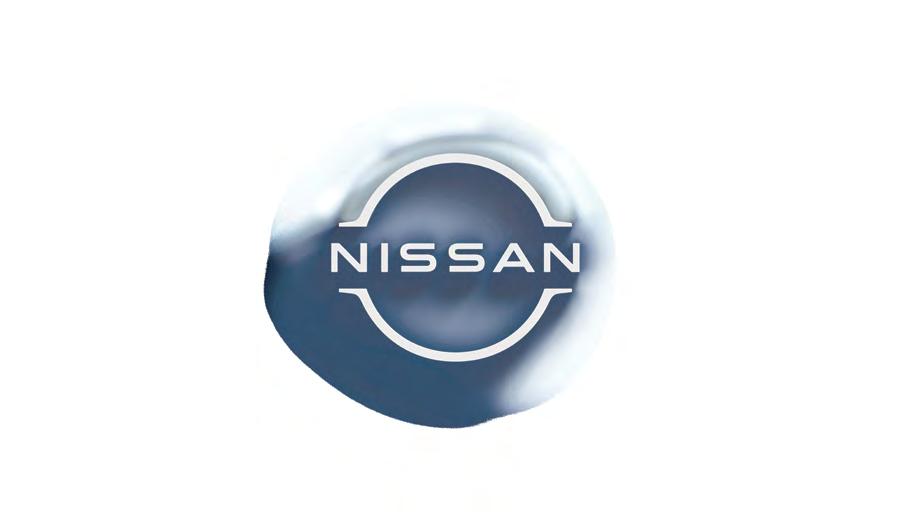THE CEO PERSPECTIVE
The Journey of Rodrigue Nacouzi Building Transcorp into a Market Leader

CONNECTING TRADE PROFESSIONALS WITH INDUSTRY INTELLIGENCE
AIR CARGO
Lifting the Lid on dnata INTERVIEW Bombardier Lands Big at Al Bateen

THE CEO PERSPECTIVE
The Journey of Rodrigue Nacouzi Building Transcorp into a Market Leader

CONNECTING TRADE PROFESSIONALS WITH INDUSTRY INTELLIGENCE
AIR CARGO
Lifting the Lid on dnata INTERVIEW Bombardier Lands Big at Al Bateen
Logistics News ME dives deep with Kanoo Logistics’ new COO, Marius van Greunen, as he reveals a game-changing transformation set to redefine the region’s supply chain future

New IVECO S-Way: high technology and efficiency on all missions
A wide choice of Euro III / V diesel engines, delivering class-leading power from 360 hp to 560 hp Euro III / 570 hp Euro V and superior fuel economy. 12-speed HI-TRONIX automated transmission with the most advanced technology in its category, electronic clutch and best-in-class torque-to-weight ratio. Full range of fuel-saving devices, such as anti-idling feature, EcoSwitch, Ecoroll and Smart Alternator. Top levels of comfort and safety, with a completely redesigned and reinforced cab, featuring enhanced direct visibility and enlarged cab livability.



50 AIR CARGO LIFTING THE LID ON DNATA
52 SUPPLY CHAIN THE SUPPLY CHAIN COMPASS
22 REFLECTIONS FROM A MONTH OF LOGISTICS TRANSFORMATION
50 24 HOURS PIERO NGADIUBA

Nestled by the coast of Lusail sits the splendor of Raf es and Fairmont Doha, where luxury is rooted in even the smallest details. Open the doors to mesmerizing hospitality and make memories in a world of sophistication.

CEO
Wissam Younane wissam@bncpublishing.net
Managing Director
CEO
Rabih Najm rabih@bncpublishing.net
Wissam Younane wissam@bncpublishing.net
Group Publishing Director
Director
Joaquim D’Costa jo@bncpublishing.net
Rabih Najm rabih@bncpublishing.net
Commercial Director
Group Publishing Director
Andrea Mocay andrea@bncpublishing.net
Joaquim D'Costa jo@bncpublishing.net
Editor-in-Chief
Editor Aya Zhang aya@bncpublishing.net
Vibha Mehta vibha@bncpublishing.net
Digital Reporter
Managing Editor
Reeba Asghar reeba@bncpublishing.net
Kasun Illankoon kasun@bncpublishing.net
Creative Lead
SUBSCRIBE subscriptions@bncpublishing.net
SUBSCRIBE
subscriptions@bncpublishing.net
PO Box 502511 Dubai, United Arab Emirates P +971 4 4200 506 | F +971 4 4200 196
For all commercial enquiries, contact jo@bncpublishing.net T +971 50 440 2706
PO Box 502511 Dubai, United Arab Emirates P +971 4 4200 506 | F +971 4 4200 196
Christian Harb chriss@bncpublishing.net
Design Christian Harb
Editorial Design
Marketing Executive
Rizaldi Febrian
Aaron Joshua Sinanbam aj@bncpublishing.net
Marketing Executive
Digital Media Producer
Aaron Joshua Sinanbam aj@bncpublishing.net
Alexander Bungas
Videographer
Eduardo Buenagua

All rights reserved © 2025. Opinions expressed are solely those of the contributors. Logistics News ME and all subsidiary publications in the MENA region are officially licensed exclusively to BNC Publishing in the MENA region by Logistics News ME.
For all commercial enquiries, contact jo@bncpublishing.net T +971 50 440 2706 All rights reserved © 2023. Opinions expressed are solely those of the contributors.
No part of this magazine may be reproduced or transmitted in any form or by any means without written permission of the publisher.
Logistics News ME and all subsidiary publications in the MENA region are o cially licensed exclusively to BNC Publishing in the MENA region by Logistics News ME.
Printed by United Printing and Publishing | upp.ae
No part of this magazine may be reproduced or transmitted in any form or by any means without written permission of the publisher.
Printed by United Printing and Publishing | upp.ae
Images used in Logistics News ME are credited when necessary. Attributed use of copyrighted images with permission. All images not credited courtesy Shutterstock.
In addition to our print edition, we’re bringing you all sorts of industry news on our web mediums. We’re looking forward to interacting with our readers on all of our social media and web platforms. See you on the web!
addition to our we’re bringing you all sorts of industry news on our web mediums. We’re looking forward to interacting with our readers on all of our social media and web platforms. See you on the web!
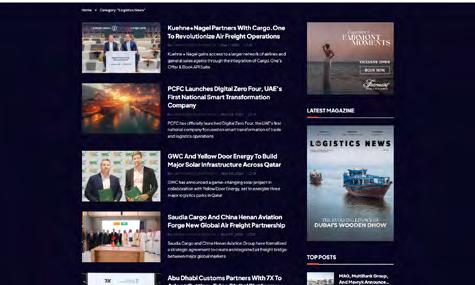


Ibelieve this universe was created with certain laws. For example, an obvious one, if you own a camel and leave it untied, there’s a strong chance it will run away. It might not happen every time, but the principle remains. Those who have risen to the top—many of whom are considered intelligent, successful, and wealthy—understand these laws and have used them in their favor.
Xiaoyue (Aya) Zhang xiaoyuezhangg EDITOR’S NOTE
Knowledge, help, and guidance can all be forms of giving away. In our daily lives, we have many opportunities to give, and we must take those chances. Not only will it help others, it will make us feel good and purposeful, and it will multiply whatever we already have. It’s like an investment, though it’s best not to view it so transactionally.
Of course, it’s easier said than done. When life is smooth and we’re in high spirits, giving feels natural. But there will be moments when it feels inconvenient, unnecessary, even silly. However, this can be a reminder for us, so that when the opportunity comes, we can take it despite whether we feel like it or not. Again, true charity is never depleted by giving; instead, it blossoms and returns to you in abundance, far beyond what was shared.
One of these laws in my opinion, though counterintuitive, is that wealth can grow through giving. No one has ever given with pure intentions without it coming back in return, I am convinced. It even comes back multiplied. No fortune has ever been diminished by an act of true charity.
While I’m referring primarily to money here, this applies to other aspects as well.
Aya Zhang Editor aya@bncpublishing.net











































































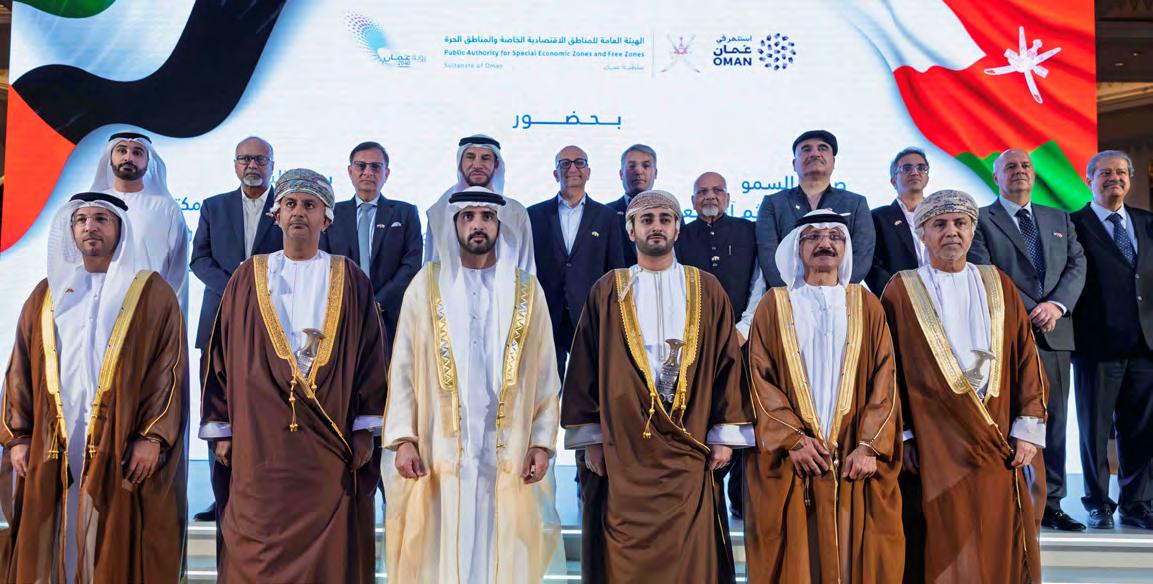
Agroup of leading UAE-based companies have signed Letters of Intent to explore investment opportunities in the newly announced Al Rawdah Special Economic Zone, a major industrial and logistics hub being developed at the Oman-UAE border.
The companies, many of which are based in the Jebel Ali Free Zone (Jafza), represent a diverse range of sectors, including logistics, manufacturing, steel fabrication and packaging. The companies include:
• Al Bayader: a leading manufacturer and distributor of sustainable food packaging
• Apparel Group: a retail operator managing over 80 fashion and lifestyle brands
• Camtech Manufacturing: a manufacturer of highperformance industrial valves
• Conares: one of the region’s largest private steel manufacturers
• Indu Kishore Logistic: a specialist in freight forwarding and multimodal logistics
• Kimoha Entrepreneurs: a provider of labeling, packaging, and RFID solutions
• NAFFCO: a global leader in fire safety and life protection solutions
• New East: a leading distributor of automotive spare parts
• Oriental General Trading: a diversified trading and distribution company
• Palmon Group: a developer and operator of industrial and logistics facilities
• Technical Resources: production and supply of high-tech generators, industrial pumps, and components linked to Parker oil and gas products
• Spinneys: diversified food manufacturer and distributor
While the Letters of Intent are non-binding, they reflect strong private sector interest in leveraging the Al Rawdah Special Economic Zone as a platform for regional expansion and cross-border trade.
His Excellency Sultan Ahmed bin Sulayem, Group Chairman and CEO, DP World, said: “The early interest shown by leading companies in the UAE reflects the strong potential of the Al Rawdah Economic Zone to transform trade and logistics between our two nations. Our vision is to create an integrated ecosystem that will open fresh opportunities for businesses and contribute to the long-term prosperity of the UAE and Oman.”
Strategically located in Oman’s Al Buraimi Governorate, Al Rawdah Special Economic Zone will provide cross-border connectivity to key regional trade corridors, including Jebel Ali Port.
Designed to support a wide range of industrial, processing and commercial activities, the zone will initially be focused on opportunities in automotive-related manufacturing, injection molding, textiles and apparel, steel fabrication, logistics and trading.
With strong backing from both the UAE and Omani governments, the Al Rawdah zone is set to become a strategic gateway for industrial growth and regional economic integration.
The zone is being developed by Mahadha Development Company, an Emirati-Omani joint venture in which DP World is the majority partner. Phase 1 of the project will cover 14 square kilometres, with expansion plans to reach 25 square kilometres in Phase 2.

Emirates Post, the official postal services provider of the United Arab Emirates, has entered into a strategic partnership with Aramex, a leading global logistics and transportation company. Through this collaboration, Aramex services will be accessed at select Emirates Post branches. This initiative aligns with Emirates Post’s broader vision to transform its national branch network into a unified hub for convenient and customer-centric shipping solutions, empowering local communities and contributing to the growth of the national economy.
As part of the initial phase, select Emirates Post branches in Dubai will begin offering Aramex’s domestic and international express services, including the shipment of what are considered Dangerous Goods (DGG) such as perfumes to select regional markets. This pilot phase will progressively extend to more branches across the UAE, reflecting the shared commitment of both organisations towards broadening service accessibility and ensuring inclusive access for communities nationwide.
The collaboration offers greater convenience to customers by bringing Aramex’s reliable logistics services to Emirates Post’s easily accessible branches. Future phases of the
partnership will introduce additional services, including parcel pickups and returns, ensuring that the partnership continues to evolve in response to growing customer expectations and the UAE’s expanding logistics demand.
Rashed Huraiz Alfalasi, Acting General Manager of Emirates Post, said: “This partnership underscores our vision of transforming the traditional understanding of a ‘post office’ into a multi-service destination built on accessibility, reliability, and innovation. By bringing Aramex’s services into our branch network, we are making it easier for individuals and SMEs to access reliable logistics solutions while strengthening the UAE’s position as a regional hub for logistics. More importantly, the move also represents a key step in our broader strategy to simplify customer experience and deliver consistent, high-quality services across the country.”
Tarek Abuyaghi, General Manager of Aramex, said: “As a key player in the UAE’s logistics landscape, Aramex remains committed to expanding its service footprint and delivering agile, customer-centric solutions across the region. Our strategic alignment with Emirates Post – a long-standing and trusted name in national postal services – enables us to further strengthen last-mile connectivity in select remote areas where demand is growing and infrastructure is still evolving. By combining Aramex’s global reach and technology-driven logistics capabilities with Emirates Post’s extensive local network and expertise, we are creating a more seamless and accessible delivery experience for our customers across the UAE.”
The integration of Aramex services represents a significant milestone in Emirates Post’s evolution into a centralised platform for Postal and Courier, Express, and Parcel (CEP) solutions, further supporting the UAE’s larger objectives of digital transformation and community empowerment.
SAL Logistics Services, the Kingdom’s national leader in cargo handling and integrated logistics solutions, has signed a strategic partnership with GCL, the parent company of Rock-it Cargo, DIETL and CARS and a global leader in specialty logistics across live events and luxury goods logistics. The agreement was signed during the Transport Logistic Europe 2025 exhibition held in Munich, Germany, marking a key milestone in SAL’s continuous efforts to expand its specialised logistics services within Saudi Arabia and across international markets, with a focus on promising sectors such as entertainment, the automotive industry, film and sports.
This partnership brings together SAL’s advanced infrastructure and extensive local reach with GCL’s global expertise in handling high-priority, timesensitive shipments. The collaboration is set to deliver best-in-class, integrated logistics solutions that ensure reliability, speed, safety, and full compliance with international standards.
Commenting on the agreement, Mr. Omar Hariri, CEO of SAL Saudi Logistics Services, stated on this occasion: “This agreement reflects our commitment to providing advanced logistics solutions that meet the
demands of high-growth sectors. Our partnership with GCL represents an ambitious strategic step toward building a more sophisticated and integrated logistics ecosystem in the kingdom while gaining expertise in managing logistics solutions for global events such as the World Cup and automotive exhibitions—aimed at supporting sustainable growth and keeping pace with the evolving needs of the sector both locally and internationally.”
Daniel Rosenthal of GCL also commented: “We are proud of our continued partnership with SAL, which exemplifies the power of combining
global expertise with regional capabilities to bring more iconic moments and precious assets to new corners of the world. As demand for live entertainment and the transport of high value goods increases across Saudi Arabia and beyond, our shared mission to deliver fast, reliable, and innovative logistics services for every shipment is more important than ever.
“ This agreement reinforces both companies’ shared dedication to service excellence and innovation. It also supports Saudi Arabia’s national vision to strengthen its global position as a leading logistics hub through high-impact strategic partnerships.


Kuehne+Nagel, a leading global logistics company, has appointed Leon Diradourian as Managing Director for its GCC+ Cluster, comprising Bahrain, Iraq, Jordan, Kuwait, Oman, Qatar, Saudi Arabia and the United Arab Emirates, effective June 1st, 2025.
With nearly two decades of experience in the logistics industry Leon Diradourian is well positioned to drive growth and development across the region. He will be based at Kuehne+Nagel’s cluster headquarters in Dubai.
Since joining Kuehne+Nagel Canada as a Sales Executive in 2010, Leon has held a number of senior leadership roles, including Regional Sales Director, Eastern Canada; Regional Vice President, Eastern Canada; and Vice President, Sea Logistics, Canada.
Most recently, he served as Vice President, Strategic Customs Development, where he was instrumental in leading the integration of Farrow, a Canada-based customs brokerage recently acquired by Kuehne+Nagel.
Upon his new appointment, Leon Diradourian comments: “Situated at the crossroads of global trade, the Middle East offers exceptional opportunities for the logistics sector. As many countries diversify their economies and explore new avenues for growth, I am honoured to lead the organisation in the region. Together with our team, I am committed to enhancing our service offerings, supporting our customers’ success, and advancing towards our Vision 2030: to become the most trusted supply chain partner supporting a sustainable future.”

In today’s volatile and fast-moving business landscape, disruptions are no longer rare; they are part of daily operations. Companies are under relentless pressure to adapt from geopolitical shocks and climate instability to economic pressures, supply shortages, and shifting consumer demands. Market uncertainty and operational stress are at an all-time high as businesses are expected to deliver faster, smarter, and with fewer resources. In this context, resilience has emerged as one of the most critical capabilities a company can develop, and at the heart of resilience lies supply chain flexibility (SCF). A Harvard Business Review analytic services survey showed that only 12 per cent of the respondents believed that their firm’s efforts at raising a culture of resilience were prosperous. Also, in
a study by the World Economic Forum in collaboration with Accenture in 2013, more than 80 per cent of companies reported that supply chain resilience is becoming a primary concern.
Initially viewed as a manufacturing concern, flexibility has evolved into a crossfunctional, multi-layered, and inter-organisational capability. It is no longer just about adjusting machine schedules or labour shifts. Today’s SCF includes rapidly scaling volumes, switching suppliers, shifting production lines, rerouting logistics, and adapting sourcing or distribution strategies in response to disruptions. It is a foundational element that allows companies to remain operational when external conditions change abruptly and turn disruption into opportunity. A great example of that is the 2011 Thai floods. The global sourcing giant Li & Fung seamlessly switched textile production from Thailand to China in just four hours, thus minimising the effect on its Western fashion chain clients (CILT, Supply chain temple of resilience, 2013). Another great example is Walmart’s flexibility when it was able to quickly divert essential assets to devastated areas affected by Hurricane Katrina and managed to send 7,000 generators to its stores in the Northeast that were in the path of superstorm Sandy at the last minute (Business Insider: Walmart: How Walmart Gets 7,000 Generators to Its Stores In The Middle Of a Hurricane, 2012).
SCF enables businesses to meet increasingly customised demand, manage variability in lead times, and navigate resource constraints, all while maintaining service levels. This adaptability is essential in a world where customers expect real-time fulfilment and personalised experiences, and political or environmental events regularly strain global supply routes. Supply contracts that allow for flexible quantities or alternative pricing models have become a powerful complement to operational capabilities, helping reduce the trade-offs between responsiveness and risk. These models can be particularly effective in multi-tier supply chains, where complexity and siloed communication often compromise agility.
Importantly, flexibility is not just an internal asset but is also embedded in relationships with suppliers, partners, and distributors. Procurement and sourcing flexibility—such as having multiple approved vendors or dual-sourcing strategies- can dramatically reduce dependency risks. Logistics flexibility, including alternate transport modes or regional warehousing, adds further robustness to operations.
Beyond physical flows, cultural flexibility is just as critical. Resilient organisations empower front-line teams to make rapid, informed decisions without excessive approvals. This
decentralised responsiveness, enabled by trust and autonomy, allows firms to react quickly when disruption strikes rather than waiting for top-down instructions.
Moreover, flexibility is increasingly viewed as a strategic capability, not just a reactive one. It is about building structural characteristics into the supply chain that allow resources to be reallocated dynamically, whether in the form of workforce, inventory, capacity, or capital. While some risks can be hedged financially, many unexpected shocks, like global pandemics or political embargoes, require operational resilience built over time into the very architecture of the supply chain. However, building this capability is not just about technology or tools; it requires a mindset shift. Too often, flexibility is treated as an optional cost rather than a strategic investment. Yet evidence suggests that even modest improvements in SCF can lead to significant value, reducing the financial impact of disruptions, improving customer satisfaction, and safeguarding shareholder value during crises.
In a business environment where the only certainty is uncertainty, supply chain flexibility is no longer a nice thing; it’s a critical enabler of resilience, continuity, and competitive advantage. Organisations investing in this capability will weather the storm and emerge from it stronger, smarter, and better equipped for what comes next.
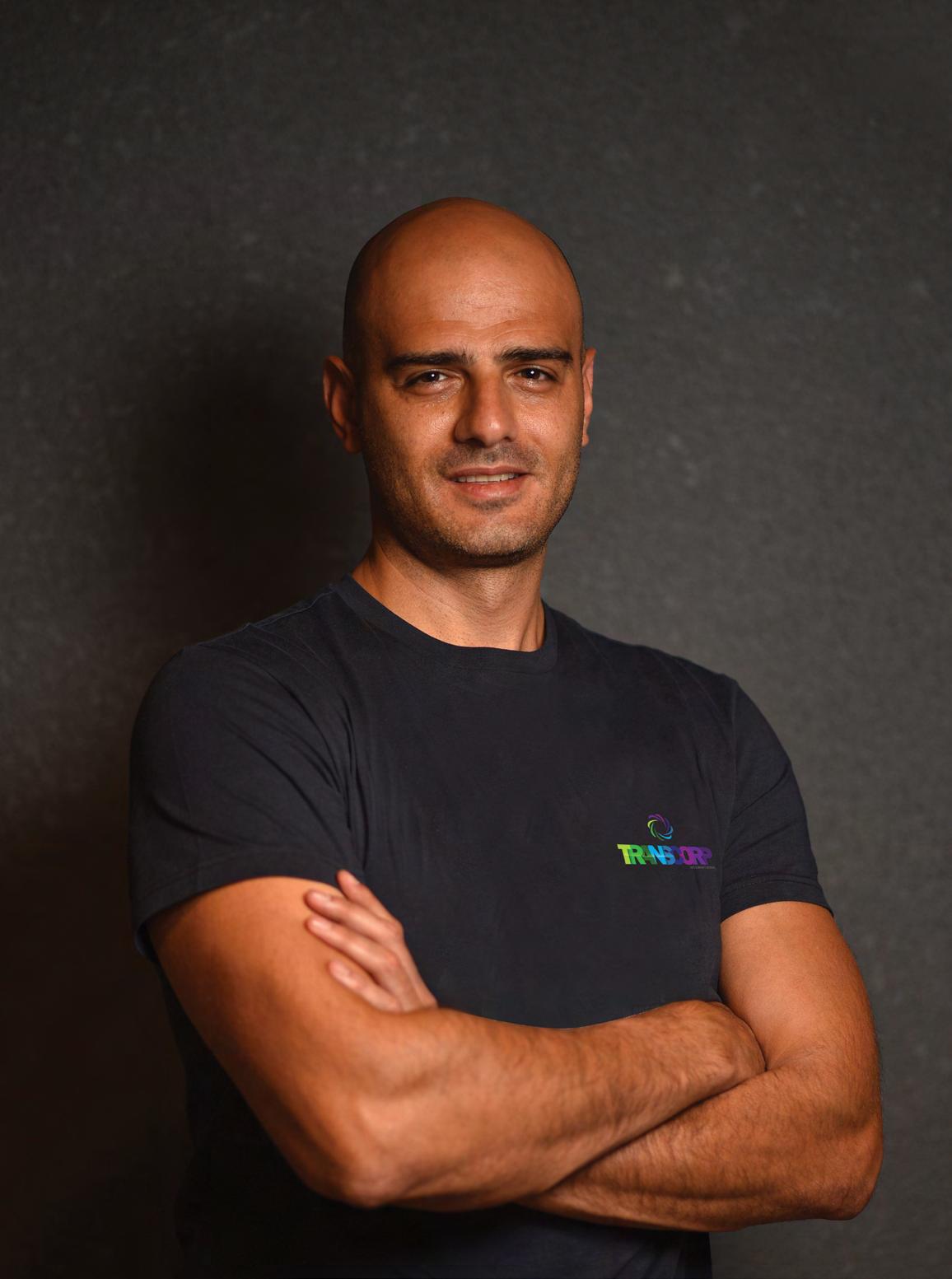

Rodrigue Nacouzi, Founder and CEO of Transcorp International, reflects on the milestones, challenges, and innovations that shaped his journey leading one of the GCC’s fastest-growing cold-chain logistics firms
The turning point came early in our journey when we secured our first major contract with a leading marketplace company in the UAE. It wasn’t just the scale of the deal that mattered, but the trust they placed in our ability to deliver highly sensitive, temperature-controlled
shipments reliably. Their validation affirmed that our vision of integrating technology with meticulous logistics could meet the demanding standards of critical industries. From that moment, we realised Transcorp was no longer just a startup — we were becoming a key player shaping the future of coldchain logistics in the region.
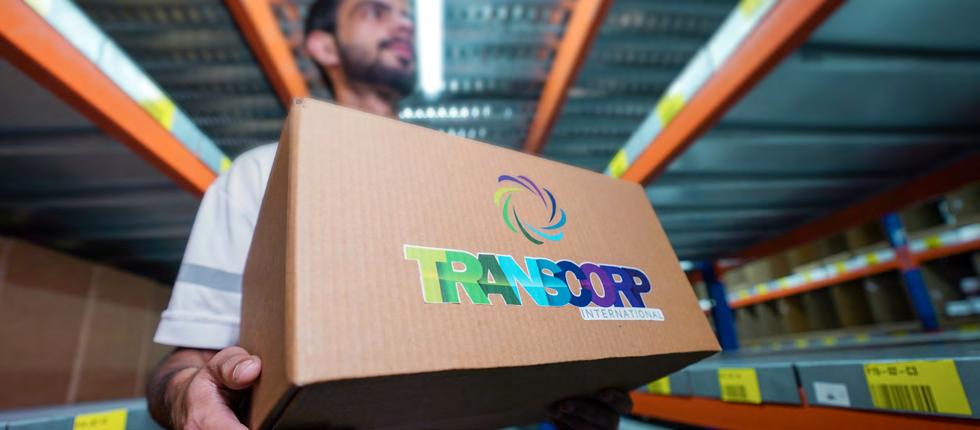
Scaling Transcorp has been both a rewarding and demanding journey. Rapid expansion presents unique challenges, especially in a complex sector like cold-chain logistics. One of the toughest hurdles was managing consistency across different markets — each with its own regulations, infrastructure, and customer expectations. Maintaining our service quality while scaling required investing heavily in local talent development and cultivating strong partnerships on the ground. Another critical factor was fostering a unified company culture despite geographical dispersion. We overcame these challenges by emphasising transparent communication, adopting scalable technology platforms, and instilling a shared mission across all teams. Our proactive approach has kept us agile and aligned as we grew.
At the core of everything we do is innovation. Innovation at Transcorp is driven by our commitment to exceed client expectations in an industry where precision is paramount. The
cold-chain sector is unforgiving — even slight deviations in temperature can ruin entire shipments. This drives us to continuously refine our processes, invest in cutting-edge IoT sensors, AI-powered route optimisation, and real-time monitoring systems. To foster innovation, I encourage a culture where every team member feels empowered to challenge the status quo and propose new ideas. We run regular innovation sprints and cross-functional workshops that blend insights from tech,
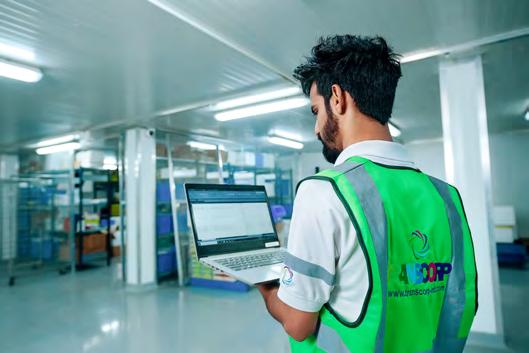
operations, and customer feedback. Celebrating wins and learning from failures openly is also key to sustaining momentum.
My leadership has evolved alongside the company. When I founded Transcorp, I was deeply involved in day-to-day operations, making handson decisions to set the foundation. Over time, my leadership evolved towards empowering capable teams and focusing on strategic growth. I’ve learned that listening deeply to employees, clients, and partners uncovers critical insights that drive better decisions. To lead effectively in a fast-changing logistics landscape, I’ve also had to cultivate resilience and adaptability — embracing uncertainty and learning continuously. Authenticity and humility, too, have proven essential for fostering trust, the cornerstone of lasting relationships with clients and employees alike.

The one moment that fundamentally shaped me as a leader was our partnership with the UAE Food Bank. At the time, we were scaling fast, focused on revenue growth, tech infrastructure, and client delivery SLAs. But this partnership reminded me that logistics isn’t just about moving goods. It’s about delivering impact.

We redesigned our cold-chain routes to support food redistribution, taking near-expiry or surplus stock from supermarkets & retailers and delivering it to those in need. That decision changed something in me. It reframed my role from building a business to building a platform, one that solves real problems, reduces waste, and serves people at both ends of the supply chain. That’s when I realised that leadership extends beyond growth metrics, aligning what we do with what truly matters.
As for the future, I believe cold-chain logistics will play a vital role in shaping sustainable, smart cities. This industry has a carbon footprint, no doubt — but we’re actively working to reduce it. We’re adopting electric delivery fleets, solar-powered facilities, and recyclable packaging. By combining smart logistics with green technology, we’re not just reducing emissions — we’re setting a new standard for responsible growth. It’s a win for the environment and for our clients.
Looking ahead, I’m incredibly optimistic about the future of cold-chain logistics in the GCC and beyond. The convergence of technology, regulatory support, and growing demand for quality-controlled supply chains creates fertile ground for innovation and growth.
In a region where supply chains are becoming smarter, more connected, and increasingly critical to economic diversification, the month of May offered a rare and dynamic window into the future of logistics. As the industry continues to evolve at an unprecedented pace, Logistics News ME was present at three pivotal events that not only captured current trends but also projected where we’re headed next.
First, at Seatrade Maritime, the focus was on the sea—the backbone of global trade. Here, maritime leaders, shipowners, port operators, and innovators gathered in Dubai to discuss the state of international shipping, the shift toward greener vessels, digital transformation at sea, and the growing relevance of the Middle East as a global maritime hub.
Next, Seamless Middle East took us into the fast-moving world of e-commerce, digital payments, fintech, and last-mile logistics. With technology reshaping how goods are bought, sold, moved, and tracked, this event spotlighted the intersection of logistics and digital consumer behavior. From automation

in fulfillment to blockchain in payments, Seamless demonstrated how agility and innovation are now prerequisites for survival.
Finally, in Riyadh, the Saudi Warehousing & Logistics Expo revealed a sector that is not just catching up—but leaping ahead.
Fueled by Vision 2030 and massive infrastructure investments, Saudi Arabia is fast becoming a logistics powerhouse. The expo showcased not only the nation’s warehousing capacity and strategic planning but also the strong appetite for international partnerships, cutting-edge tech, and workforce development.
Across these three stages, a few common threads emerged: resilience, innovation, and a bold regional ambition to lead rather than follow. In the pages ahead, we bring you insights, interviews, and key takeaways that reflect the energy, challenges, and opportunities shaping logistics in the Middle East.
Welcome to our special event coverage— where the future of movement is being written in real time.


At the recent Seatrade Maritime Event in Dubai, Nawaf Abdulla, Executive Vice President for Container Terminals at DP World GCC, shared valuable insights into Jebel Ali Port’s strategic role in maritime operations, its recent milestones, and future growth plans

DP World Jebel Ali is a vital hub for regional trade and a safe harbor for vessels in distress. “It’s critical to support the maritime and shipping industries during emergencies as well as in
routine operations,” Nawaf said. He detailed the port’s structured process for assessing risk, securing approvals, and coordinating operations to manage vessels facing emergencies safely.
Beyond emergency response, Jebel Ali is also investing in continuous upgrades. Nawaf
highlighted enhancements in equipment, terminal systems, and workflows to boost efficiency. “We’re building a seamless digital experience for traders to speed up vessel turnaround and cargo delivery,” he said.
In 2024, the port handled 15.5 million TEUs, helping it

maintain its position as the 10th largest port globally. This milestone signals the port’s growing influence in the GCC and its commitment to worldclass service.
Nawaf called the Seatrade event an essential platform for engagement with ship owners, agents, suppliers, and government bodies. “Being here
helps us stay connected with partners and unlock new opportunities,” he said.
As Jebel Ali pushes forward with innovation, resilience, and collaboration, it is clear that the port will continue to drive maritime excellence in the region and cement its position as a dependable port of refuge for ships navigating uncertainty.
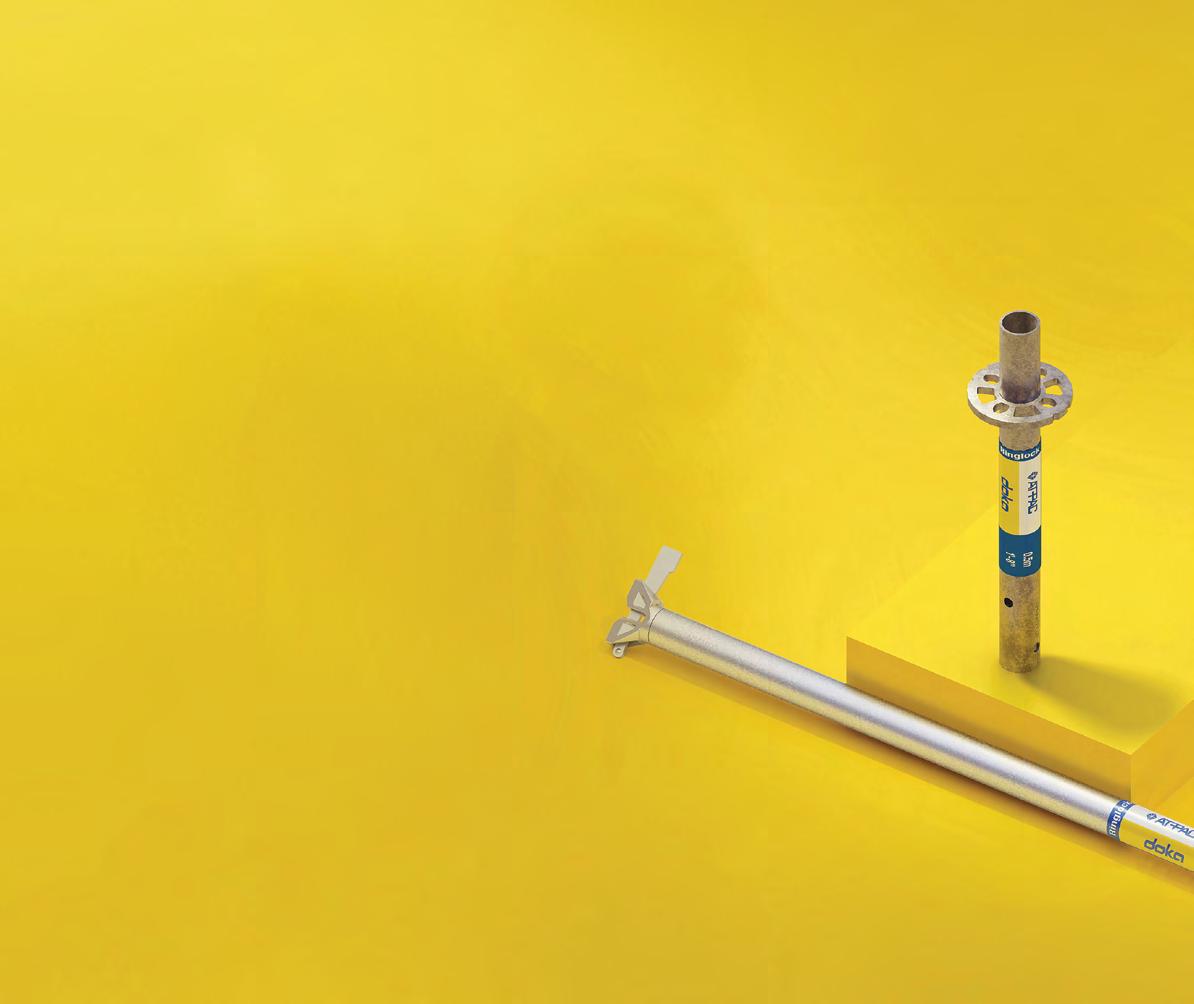

Require formwork and scaffolding? Check out Doka’s extensive list of products and systems, which now includes scaffolding for a variety of applications. At Doka, our philosophy is to provide a broad range of services under one umbrella based on a growing demand for single-source solutions that adhere to the highest standards.
/DokaMEA /company/doka-middle-east-africa /doka_mea
meaapmarketing@doka.com | www.doka-me.com

Tarek Abu Yaghi, General Manager at Aramex, opened up about the company’s strategic shift, tech-driven ambitions, and the realities of competing in a fast-moving logistics landscape
At this year’s Seamless Middle East 2025, held in Dubai in May, the spotlight was firmly on artificial intelligence, digital transformation, and the future of logistics in a rapidly evolving market. Among the prominent voices at the event was Tarek Abu Yaghi, General Manager at Aramex, who spoke about the company’s evolving strategy, the role of technology, and the challenges shaping the logistics landscape.
Seamless has grown into one of the region’s most influential gatherings for leaders in fintech, retail, e-commerce, and logistics. Aramex, a regular participant, returned this year with a clear focus: demonstrating how innovation (particularly in AI) will define its next chapter.
“It’s very exciting to be here again with the Aramex team,” said Abu Yaghi. “We see Seamless as a key platform for collaboration and for staying on top of the latest in tech, fintech, and logistics.” He noted that the UAE continues to lead on digital trends, especially in AI, and that Aramex intends to remain an active player in this transformation.
While details remain under wraps, Abu Yaghi confirmed that several AIpowered logistics solutions are already in development. “The future is about how you embed this technology into your core offering, not just as a tool, but as part of the service itself,” he said.
This year’s Seamless comes at a time of both opportunity and pressure for the logistics industry. Abu Yaghi acknowledged the intensifying competition in the sector and pointed to service differentiation as a critical priority. “The market is
crowded. There’s a lot of movement. The main challenge now is becoming more competitive and delivering on what makes you different.”
Aramex is responding with a renewed emphasis on last-mile delivery, improved digital integration, and ongoing partnerships with regional stakeholders. Abu Yaghi described these efforts as “well underway,” with the goal of turning concepts into fully operational services that directly benefit clients in the UAE and beyond.
“Speed, precision, and integration — those are the standards we’re holding ourselves to,” he said. “We’re working hard to ensure that everything being developed now becomes a real-time solution very soon.”
As digital transformation accelerates across the logistics sector, Aramex is aligning its strategy to meet rising expectations — not only by embracing innovation, but by actively shaping it. The company’s presence at Seamless 2025 underscored its intent to lead through technology, resilience, and meaningful partnerships in a market that rewards both speed and foresight.


Yasser Zahreddine, Managing Director – Eastern Gulf, SMSA, talks about the company’s digital transformation, strategic expansion into Africa, and the importance of Seamless Middle East as a platform to connect with industry leaders
Originally founded in Saudi Arabia. What began as a regional solution provider has now expanded significantly, with a strong operational presence throughout the GCC countries — including Saudi Arabia, UAE, Qatar, Kuwait, and beyond — as well as strategic expansion into Africa through its recent acquisition of Namlog Group.
This expansion aligns with SMSA’s ambitious growth strategy. The company is not just growing organically with numerous ongoing projects across the GCC but also broadening its footprint internationally to meet increasing demand in emerging markets. Its extensive logistics infrastructure spans more than 150,000 square meters of warehouse space, enabling it to deliver both B2B and B2C solutions tailored specifically to the e-commerce sector, which continues to rapidly evolve in the region.
Currently, SMSA is undergoing a transformative phase with a strong focus on digital innovation.
Collaborating with technology partner Huawei, the company is developing an AI-powered logistics platform designed to automate many previously manual operations such as route optimisation and parcel sorting. This digital transformation is pivotal in increasing operational efficiency, improving accuracy, and enhancing the overall customer experience. “Traditionally, much of what we do has been manual, but now we are embracing technology to automate and streamline processes,” Yasser explained. The company is preparing to launch these new capabilities imminently, which will empower both customers and operations with smarter, faster, and more seamless logistics services.
Participation in key industry events like Seamless marks an important milestone for SMSA. While this is their first time actively engaging in the event, they see it as a vital platform to introduce themselves to the wider regional market and to communicate the extensive range of services they offer. “Being part of Seamless helps us tell the community
Yasser Zahreddine, Managing Director –Eastern Gulf, SMSAYasser Zahreddine, Managing Director –Eastern Gulf, SMSA
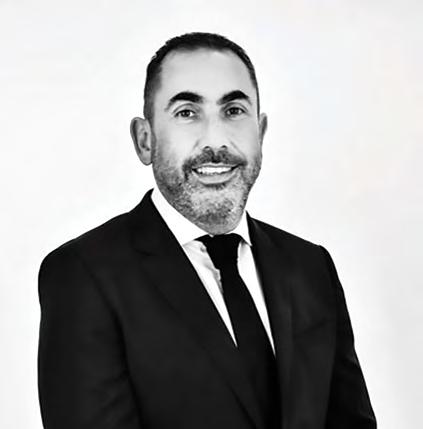
that SMSA exists, and more importantly, show the value we can bring through customisable services and solutions tailored to diverse customer needs,” Yasser said. Engaging with peers and customers at such events also reinforces SMSA’s commitment to contributing meaningfully to the region’s growing e-commerce ecosystem.
Discussing the current state of the logistics and e-commerce industry in the GCC and broader Arab region, SMSA highlights the tremendous growth and development underway. The B2C sector, in particular, is booming as consumers increasingly trust online shopping. The adoption of digital payments has accelerated significantly, marking a sharp shift from the previously dominant cash-on-delivery (COD) model. Banking institutions have introduced innovative portals and secure payment gateways, while consumer awareness around fraud prevention has
risen, contributing to this positive trend. “This shift to digitisation and the use of digital wallets and other payment methods is a big driver of industry growth, especially in last-mile delivery services,” Yasser noted.
SMSA points out that the industry’s main focus has shifted towards offering integrated and comprehensive solutions that cover the full logistics lifecycle. Rather than separating B2B and B2C operations, customers now expect end-to-end services that encompass everything from import clearance and customs brokerage to final delivery. To meet these complex demands, SMSA has developed a versatile platform that can manage multiple facets of the logistics process, ensuring clients receive seamless, hassle-free service. “Our customers want solutions that cover all their logistics needs, and that requires having well-trained, agile personnel who understand how to deliver across different requirements,” Zahreddine said.
What sets SMSA apart in a competitive and fast-changing market is their deep collaboration with retailers and relentless investment in technology and people. Internally, the company fosters a work environment that encourages flexibility
and creativity, empowering employees to work without the fear of making mistakes. This flat organisational structure streamlines decision-making and accelerates responsiveness to market changes. “Our approach is simple: we create a healthy, agile workplace where our teams are free to innovate and grow, which directly benefits the customers,” Yasser noted.
Looking towards the future, SMSA is focused on maintaining its agility and adaptability in a logistics landscape that is constantly disrupted by new technologies and shifting customer expectations. The pace of change today is much faster than in the past, and the company embraces this dynamic environment by continually upgrading its services and training its workforce. “In the past, changes happened slowly, but now disruptions occur every few years or less. We’re making sure our teams are ready with a mindset that embraces change and innovation to meet evolving customer needs,” Yasser shared.
As e-commerce continues to reshape retail and consumer behavior across the Middle East and Africa, SMSA’s comprehensive service offerings, technological advancements, and customercentric philosophy position it as a key player driving the region’s logistics transformation. Their commitment to innovation, operational excellence, and close collaboration with customers and partners signals a bright future in supporting the growing demands of the digital commerce economy.
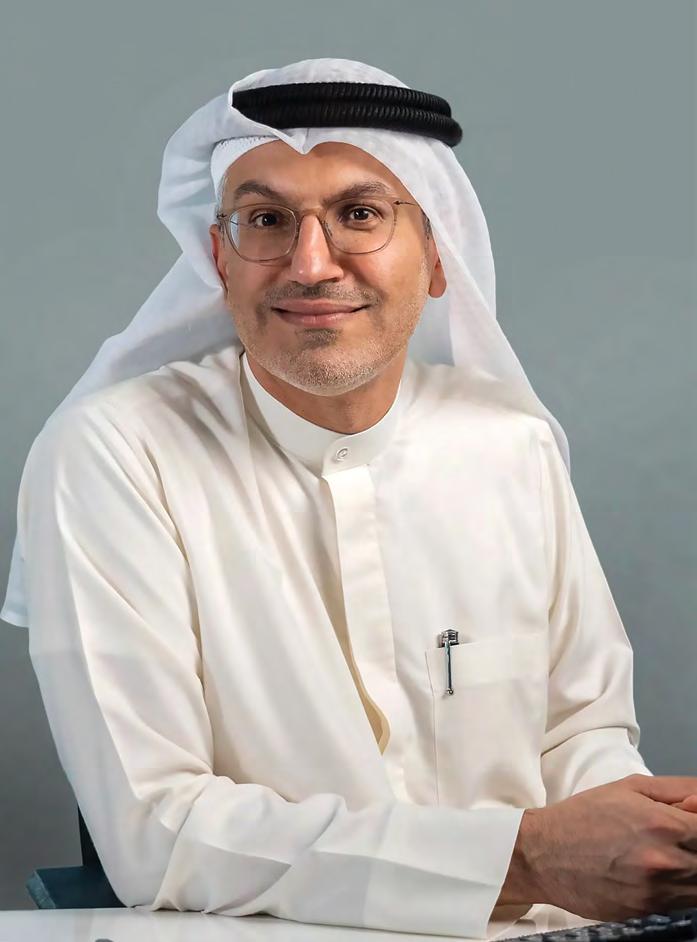
Mohsen Ahmad, CEO of the Logistics District at Dubai South, highlights the rapid growth and transformation of e-commerce and logistics in the UAE and the broader MENA region
Seamless has become a key milestone event for industry leaders involved in e-commerce and digital commerce across the Middle East, and Dubai South has been actively participating since launching its EZDubai in 2019. The event’s growth over the years mirrors the expansion of the e-commerce sector in the region, which continues to attract global attention.
The latest E-Commerce Report in the MENA Region 2024, published by EZDubai in collaboration with Euromonitor International, reveals compelling figures illustrating this growth. The UAE’s e-commerce market reached AED 32.3 billion (USD 8.8 billion) in 2024 and is projected to exceed AED 50.6 billion (USD 13.8 billion) by 2029. This surge is driven by a young, techsavvy population that favors online shopping, supported by robust infrastructure, widespread internet access, and efficient delivery networks.
Top product categories by value include apparel and footwear, consumer electronics, and home care. Payment preferences have also evolved—with digital wallets growing significantly, from 41% usage in 2020 to 53% in 2024—while flexible payment methods like Buy Now, Pay Later continue to boost conversion rates and average basket sizes.
Regionally, the MENA e-commerce market reached AED 126.7 billion (USD 34.5 billion) in 2024, a 13% year-on-year increase, and is expected to hit AED 212.2 billion (USD 57.8 billion) by 2029. Growth in mobile commerce and cross-border transactions is fueling this expansion, underpinned by infrastructure investments and government-backed digital initiatives.
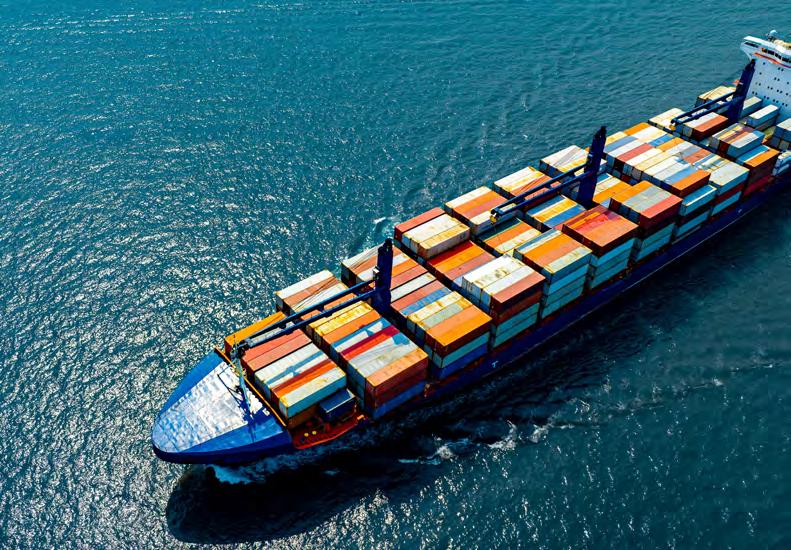
Mohsen Ahmad emphasises the strategic role of Dubai South’s Logistics District within the UAE’s broader vision of becoming a global logistics hub. The UAE’s early and substantial investment in world-class infrastructure (including ports, airports, road networks, and rail) has positioned the country as a key connector across the Middle East, Africa, Southeast Asia, and CIS countries.
Logistics now contributes approximately 14% of the UAE’s GDP, underscoring its critical economic impact, especially for Dubai. Dubai South’s connectivity, coupled with streamlined customs and regulatory processes, ensures efficient trade flows that benefit regional and global stakeholders alike.
Looking ahead, the logistics sector is witnessing
a transformation marked by convergence and integration. Traditional players such as shipping lines and airlines are expanding into third-party logistics, while customer demand increasingly centers on seamless, end-to-end solutions that offer real-time visibility and comprehensive services.
E-commerce continues to reshape shipment patterns—smaller, more frequent deliveries dominate, driven largely by sellers in the Far East targeting Middle Eastern consumers. This trend points to an increasingly dynamic and interconnected trade environment.
Aligned with Dubai’s ambitious economic plans such as D33, Dubai South remains committed to doubling trade volumes and fostering innovation that bridges social and cultural dimensions alongside business growth. Through these efforts, Dubai South and its partners continue to lead the way in shaping the future of e-commerce and logistics in the region.


Amid the buzz of Riyadh’s premier logistics expo, Logistics News ME dives deep with Kanoo Logistics’ new COO, Marius van Greunen, as he reveals a game-changing transformation set to redefine the region’s supply chain future
Good afternoon, Marius. It’s great to see Kanoo Logistics with such a strong presence at this year’s Saudi Warehousing and Logistics Expo. How are you finding the event so far?
Good afternoon! It’s been a fantastic start. We’re very excited to have our own booth here this year. The energy has been incredible, very busy and productive. The event has brought together the right mix of suppliers and industry players, and it’s a great platform for us to showcase our journey and engage with partners.
Let’s talk about that journey. Kanoo Logistics has a longestablished presence in the region. Can you walk us through the company’s history and how it has evolved over the years?
Kanoo Logistics was first founded in Bahrain, as part of the Yusuf Bin Ahmed Kanoo Group, which has been established since 1890 — so the company has been around for over 135 years. Originally, our name was supposed to be Kanoo Logistics, but the then Emir of Bahrain requested that, since we were the only logistics company in Bahrain at the time, we include

‘Bahrain’ in our title. As a result, we changed our name to Bahrain International Cargo Services — a special request from His Majesty.
Initially, we operated as a freight forwarding company and provided customs clearance services. Over the years, we have worked with major clients such as Aramco, Bapco, and other leading oil and gas companies across the region. More recently, we have been expanding into fast-moving consumer goods, pharmaceuticals, and other specialised logistics sectors.
We are also heavily involved in project management. For example, we managed Bahrain’s Formula One logistics for about 15 years and have handled jewellery
exhibitions and other high-value goods for over 25 years. This has given us extensive experience in managing exhibitions and events, particularly those requiring enhanced security and detailed logistical arrangements.
That’s quite the transformation. What prompted this shift from a traditional freight model to a full-service logistics provider?
There were two key drivers. First, customer demand. Our clients increasingly expect full visibility and seamless service integration, not just shipping, but storage, handling, compliance, and real-time tracking.
Second, regulatory changes in the region made it clear that we had to evolve. As

a result, we transitioned from being asset-light to pursuing an asset ownership strategy. We’re now actively investing in our
own fleet, warehouses, and infrastructure, particularly in temperature-controlled logistics. This gives us greater control, flexibility, and reliability.
We’re also currently undergoing a major digital transformation. By the end of June, we’ll be going live with Oracle, a complete ERP solution. This system will fully integrate our operations, from customer interfaces to back-end logistics, and will improve our efficiency and compliance.
The goal is to create seamless data flow between us and our customers. This isn’t just a software upgrade, it’s a complete shift in how we operate, making us more agile, transparent, and
aligned with global best practices.
What are some of the biggest challenges you’ve encountered during this transformation? I think one of the key challenges has definitely been change management. It’s always a relevant topic, especially when you’re going through a digital transformation or changing the quality or even the type of service you offer. Those kinds of shifts inevitably involve managing change — and the truth is, most people don’t naturally like change.
It really comes down to how much change people are willing to accept, endorse, or absorb. That’s been both one of our strengths and one of the areas where we’ve had to learn and grow as a business.
From a people perspective, the important part is communicating the vision — helping the team understand it, see it being implemented, and ultimately

embrace it. That’s been one of the key challenges, but also a rewarding one. Seeing people buy into the journey and adapt has been incredibly encouraging.
Change isn’t always easy, but it’s necessary.
You’ve recently joined Kanoo Logistics. Tell us more about your role and what you’ve seen from inside the company. Yes, I’ve been with Kanoo for about nine months, though I’ve lived in Saudi Arabia for 16 years, so I understand the regional landscape well.
As COO, I oversee operations across Saudi Arabia and Bahrain. My responsibility is to ensure quality service, operational efficiency, and team performance. I’m also involved in talent development, especially hiring and mentoring local talent across the region.
What’s unique about Kanoo is that it’s a family-owned business, one that genuinely reflects family values in its operations. That’s rare today. You can

feel it in the culture: decisions are made with people in mind, not just numbers.

If you look at the percentage of staff, 57% of our workforce has been with the company for 15 years or more. That says a lot about the environment we’ve built. Additionally, we’ve made strong progress in Saudi Arabia, 59% of our employees are Saudi nationals.
We’re also proud of our gender diversity, especially in the Kingdom, where we’ve reached an 80/20 male-to-

female ratio and that’s quite good for a local company.
From your perspective, what’s the single most important factor for success in logistics today?
I would say one of the key factors in driving success within a logistics business is having patience — especially when it comes to growth. It’s crucial that when we set out an investment plan, particularly in the early phases, we focus on delivering what we’ve committed to.
As a team, we all need to ensure we fulfil those investments in order to grow the business further — and in doing so, allow our people to benefit from that growth as well. It’s really important that we, collectively, deliver on the promises we’ve made around investment and expansion.
Looking ahead, what’s next for Kanoo Logistics?
I believe the next step for Kanoo Logistics is closely tied to the developments happening here in the Kingdom. Saudi Arabia is becoming a major gateway for the region.
In the past, around 70% of products were imported into Saudi Arabia via the UAE. However, this dynamic is shifting, with imports increasingly coming through the Kingdom’s main seaports.
Kanoo wants to be an integral part of this growth — leveraging our central location and establishing ourselves as a logistics company that offers not just freight forwarding, but comprehensive end-to-end solutions for our customers.
That is what lies ahead for Kanoo, and we’re committed to achieving it very soon.
Thank you, Marius. It’s been a pleasure speaking with you, and we look forward to seeing what lies ahead for Kanoo Logistics. Thank you. It’s been a pleasure. I’m excited about what’s to come for Kanoo, for our customers, and for the region.
Eng. Khaled El Moursi, COO of MS Logistics, is driving a bold new chapter in Saudi Arabia’s logistics landscape, one where state-of-the-art cold storage meets sustainability and strategic growth to support the nation’s food security ambitions

At the Saudi Warehousing and Logistics Expo, Logistics News Middle East had the opportunity to speak with Eng.
Khaled El Moursi, Chief Operating Officer of MS Logistics. The company
is one of Saudi Arabia’s emerging leaders in cold chain warehousing. With roots firmly planted in the Kingdom and eyes on national expansion, MS Logistics is redefining what high-standard food storage means in the Gulf.
Founded in 2021, MS Logistics is a 100% Saudiowned company that has rapidly grown to become a key player in food warehousing — with a specialty in chilled and frozen storage. “We are a leading destination for providing comprehensive cold chain solutions,” says El Moursi. “Our facility in Riyadh is currently the largest food warehousing operation in the capital, and it’s fully equipped with state-of-the-art technology.”
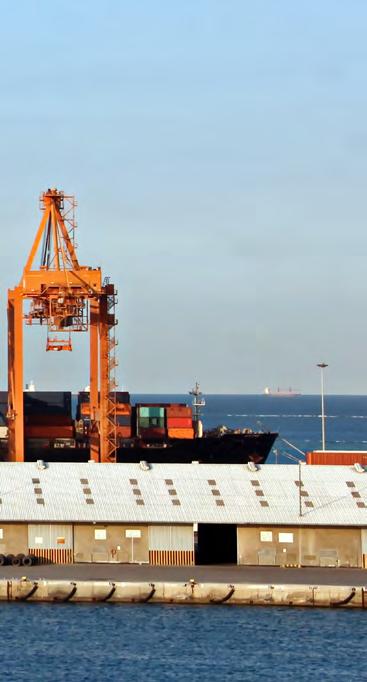
The company has invested heavily in modern infrastructure. Its flagship Riyadh facility features an advanced cooling system engineered for energy and water efficiency — aligning with broader sustainability goals.
Central to their operation is a highly advanced Warehouse Management System (WMS), which El Moursi notes ensures 100% inventory accuracy.
With decades of experience in the Kingdom, El Moursi has witnessed the transformation of Saudi Arabia’s logistics sector firsthand. “The government’s support has been phenomenal,” he explains. “There’s a growing demand for world-class food storage solutions, and we’ve positioned ourselves to meet that demand with excellence.”
Looking ahead, MS Logistics is aligning its expansion with Saudi Arabia’s Vision 2030. The company is already in the design phase for a new
facility in Jeddah, with plans to follow in Jizan and Dammam. “Our goal is to build a national network of high-standard cold storage facilities to support the country’s food security and distribution needs,” says El Moursi.
As Saudi Arabia races to become a global logistics hub, companies like MS Logistics are laying the cold, hard groundwork — quite literally — for a food-secure, technology-driven future. Their blend of innovation, sustainability, and national vision makes them a company to watch in the years ahead.
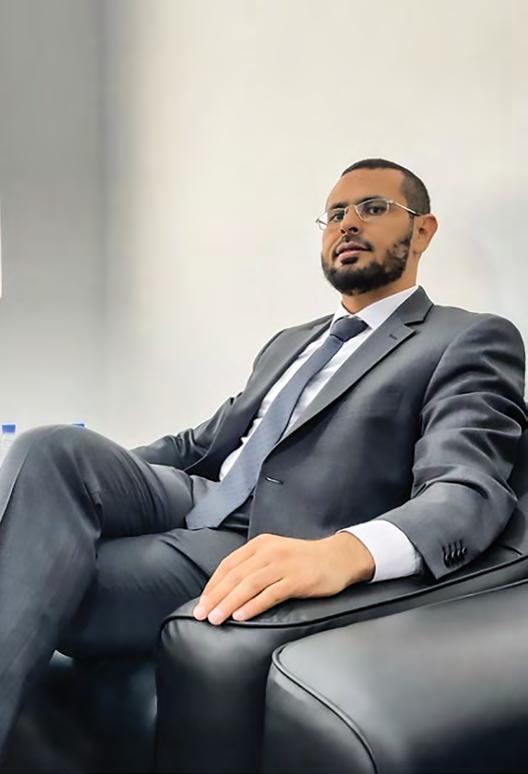

Inigo Arranz, General Manager MEA Region, Smartlog, shared insights on the company’s regional presence, technology strategy, and vision for the future during the Saudi Warehousing and Distribution Expo
Smartlog Group, a leading system integrator for automated warehouses, continues its expansion in the Middle East, with its regional head office based in Riyadh, Saudi Arabia. We caught up with Inigo Arranz, General Manager for the Middle East and Africa region at Smartlog, during the Saudi Warehousing and Distribution Expo, where the company showcased its innovative technologies.
“Smartlog Group is a system integrator originally from Spain. We’re present all over Europe,
Latin America, and have been in the Middle East for the past three years.” Inigo said.
The company specialises in the integration of automation technologies for warehouses. “We do system integration for automated warehouses. We integrate systems such as AutoStore, Smart Pallet, and more. We also have our own developed Warehouse Management System (WMS), through which we integrate the different technologies,” Arranz explained.
In the Middle East, Smartlog’s operations are firmly anchored in
Saudi Arabia. “Our head office in the region is in Riyadh — Saudi is our base. But we offer our services in the UAE, Oman, Egypt, and we’re open to expanding into new countries.”
When asked what sets Smartlog apart from competitors, Arranz emphasised the company’s focus on data. “What makes us competitive is the importance we give to data. All our solutions are based on the data we get from potential clients — that’s the first and most important step. We analyse that data and then decide which technology best fits the client’s needs.”
Smartlog’s presence at this year’s Saudi Warehousing and Distribution Expo marks its second consecutive participation. “We participated last year, and it was a very successful expo, so we decided to return. Also, both Saudi and the region are becoming global logistics hubs, and we believe this is the place to be — that’s why we’re here.”
Looking ahead, Smartlog has a clear vision for growth. “What’s next? Keep growing. We’ve been experiencing strong growth not only in the Middle East, but across the globe. Our goal is to continue helping Saudi companies and businesses in the region — that’s the main reason we’re here.”
The company’s mission is aligned with the rapid transformation of the regional logistics sector — and with its commitment to innovation and integration, Smartlog is well-positioned to play a key role in that evolution.




Mohammed Bakr Gazzaz, CEO of EVIQ, is spearheading the Kingdom’s rapid transition to electric mobility by overseeing the development of a comprehensive charging infrastructure that supports the widespread adoption of electric vehicles
The Electric Vehicle Infrastructure Company (EVIQ) is a pioneering joint venture between Saudi Arabia’s Public Investment Fund (PIF) and the Saudi Electricity Company (SEC).
Tasked with accelerating the Kingdom’s shift to electric mobility, EVIQ is building a cutting-edge network of fast-charging stations across strategic locations nationwide. With a goal to deploy over 5,000 chargers by
2030, EVIQ is at the forefront of enabling a sustainable and fully integrated EV ecosystem in Saudi Arabia.
Why Charging Stations Are Key to Logistics Companies’ Shift from Traditional to Electric Vehicles
Charging infrastructure is the cornerstone of EV adoption. Without a robust, convenient, and strategically distributed charging network, EV adoption slows down.

EVIQ recognises the need for a robust network spread across key locations throughout the Kingdom, from highways to residential neighbourhoods.
Throughout the company’s journey to charting the electric future of Saudi Arabia mobility, EVIQ is committed to providing premier EV charging solutions in line with the Kingdom’s national vision. Beyond infrastructure, EVIQ fosters collaboration with EV leaders, strengthens private sector involvement, and champions local R&D, boosting national expertise and innovation.
EVIQ’s
While the Kingdom is witnessing a clear shift when it comes to EV education and adoption, there is still a unique set of challenges—these could include but are not limited to infrastructure readiness, operational complexity, and a range of consumer concerns.
Still, there is a lack of widespread, high-capacity charging infrastructure across the Kingdom. Range anxiety and the absence of high-capacity charging corridors across logistics routes further create challenges for fleet planning. With this, Saudi Arabia is investing heavily in building a robust network of charging stations nationwide to accelerate EV adoption, and EVIQ is leading the charge.
Earlier this year, the business inaugurated its first highway charging station at SASCO Aljazeera, located on the vital Riyadh-Qassim highway. This announcement marked a significant step in the wider regional effort to promote sustainable transportation, ensuring EV drivers are provided convenient access to charging facilities, eliminating range anxiety, a key consumer concern.
In line with the Kingdom’s Vision 2030, EVIQ is spearheading
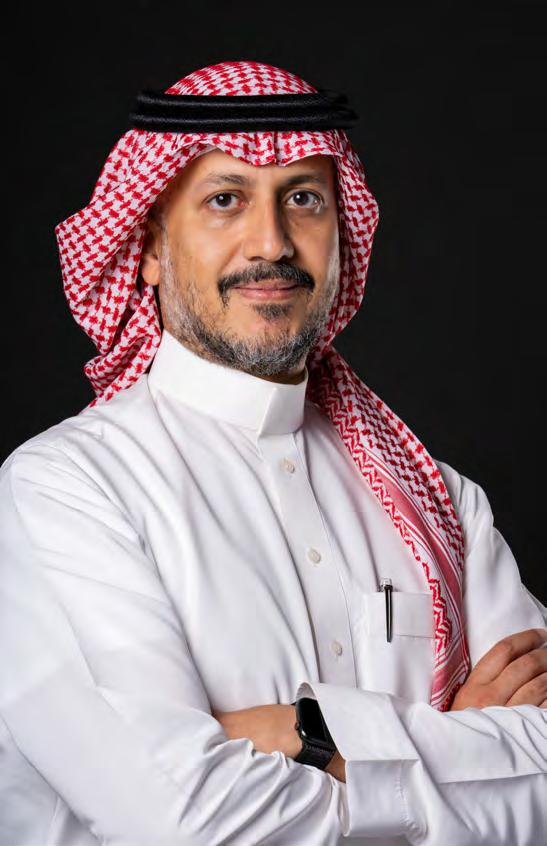
Mohammed Bakr Gazzaz, CEO of EVIQ,
the enablement of the EV ecosystem in Saudi Arabia. Electric vehicles are the future. With a high interest in EVs among Saudi consumers, the availability of a fast and reliable charging network for EVs across the Kingdom is essential in converting this interest into adoption.
As a leader in enabling the local EV ecosystem, the company’s role is to bridge this gap by providing a nationwide network of reliable fast-chargers through strong partnerships with local firms for installation and maintenance. EVIQ is establishing a robust foundation for the sector, making electric mobility more attractive and accessible to consumers and investors alike.
Zeshan Malik, Vice President Corporate Development & Aftermarket Program Management, Bombardier Inc

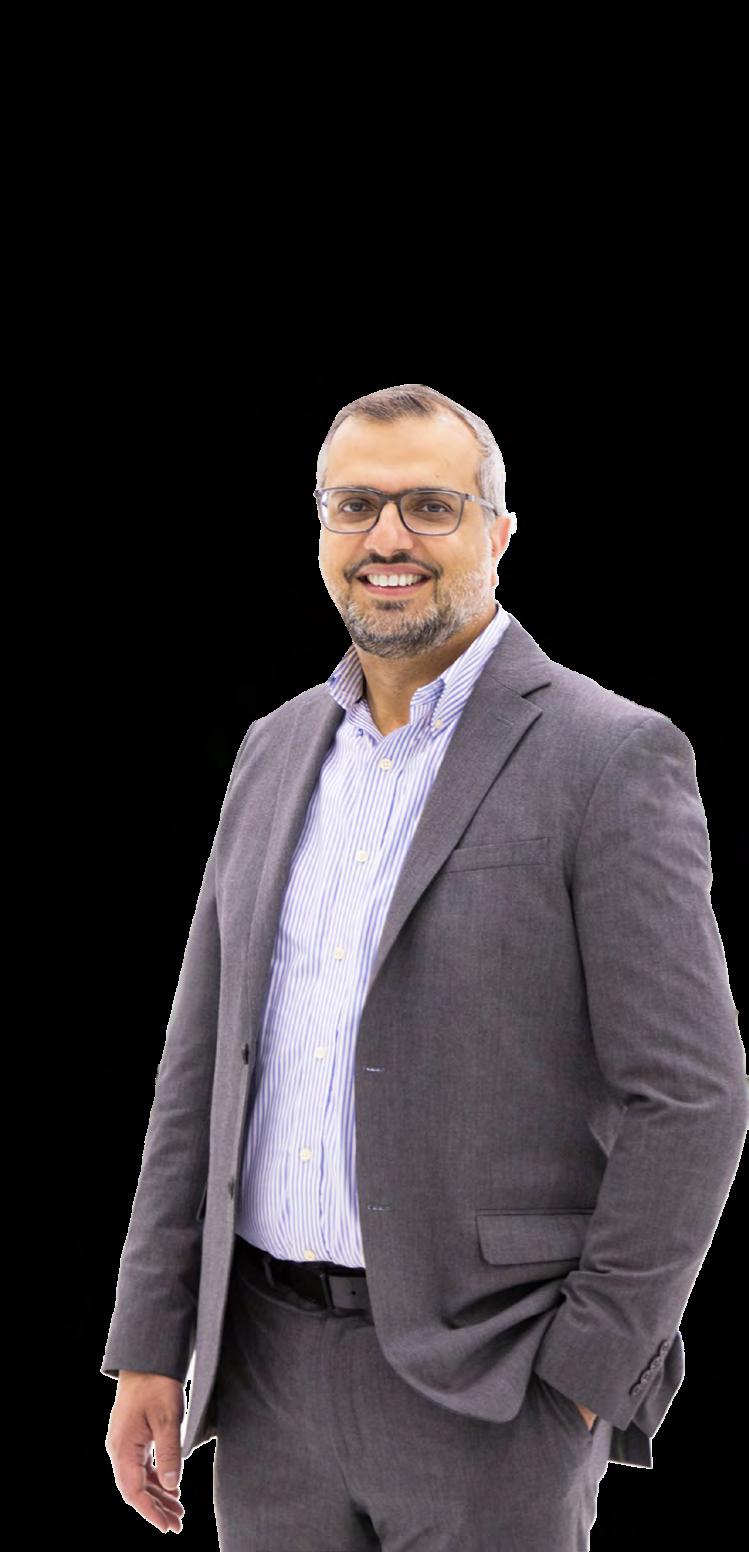
Zeshan Malik, Vice President - Corporate Development & Aftermarket Program Management, Bombardier Inc, underscored the company’s strategic decision to relocate its planned MRO facility to Al Bateen Executive Airport, citing the airport’s prime location, growing customer base in Abu Dhabi, and Bombardier’s goal to strengthen its aftermarket footprint in a region that continues to see rising demand for business aviation
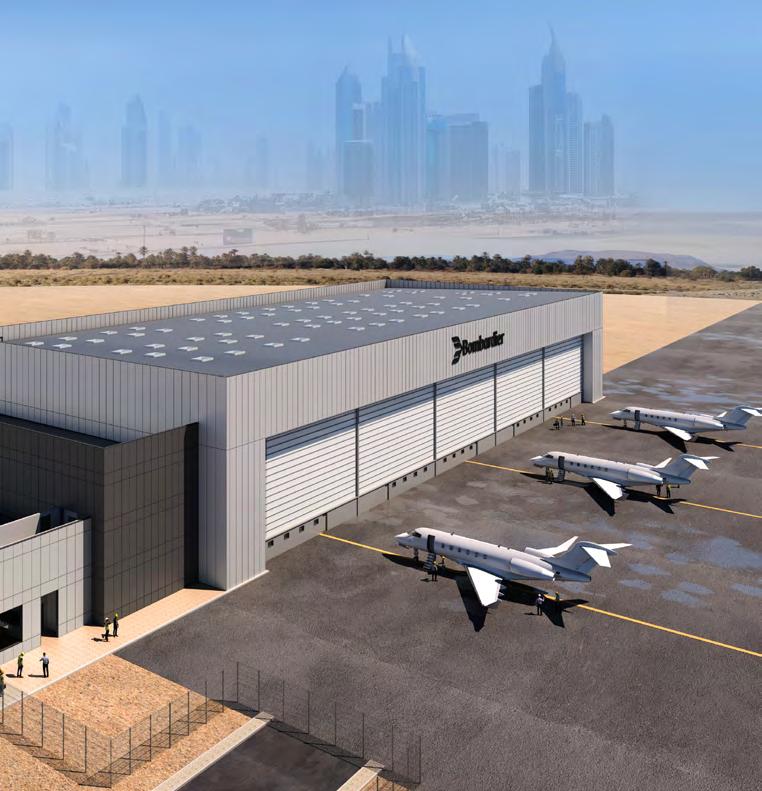
What motivated Bombardier to shift its planned MRO facility from Abu Dhabi International Airport to Al Bateen Executive Airport?
Bombardier selected Al Bateen Executive Airport as the location for its new approximately 120,000 sq. ft. service facility because the airport is an important hub for our business aircraft in the Middle East. As the only dedicated executive airport in UAE, the new site is strategically located close to the financial hub and business centre of Abu Dhabi, making it the perfect choice for Bombardier’s discerning business aviation customers – and an easy location for our customers to fly in and out of.
We have also seen an increase in Bombardier aircraft transitioning through Abu Dhabi over the last number of
years. Several of our long-term customers are based in Abu Dhabi and we are also seeing growth in the Abu Dhabi market.
Can you give us a walkthrough of the new facility’s capabilities? How will it enhance the customer experience?
The new service facility is uniquely positioned to offer easy and convenient maintenance, repair and overhaul (MRO) capabilities for Global, Challenger and Learjet customers, including the world’s most impressive business jet, the Global 8000, building on Bombardier’s commitment to its customers in this critical market.
The new facility will feature more than 55,000 sq. ft. of hangar space, a parts depot and a complete suite of maintenance services including scheduled and unscheduled heavy maintenance, aircraft modifications, and aircraft on ground (AOG) capabilities.
It’s also important to remember that when establishing any new facility, Bombardier always wants to ensure we inject some of our Bombardier DNA – and as with our Dubai Line Maintenance Station, we will do the same at our new service facility.
Bombardier is known for cutting-edge aircraft like the Global 8000 as you have just mentioned, how is this facility equipped to support next-generation aviation technologies?
With its enhanced service and support capabilities, the new service centre at the Al Bateen Executive Airport is uniquely positioned to cater to the needs of our Global aircraft customers, including the new Global 8000.

The new service facility will have more than 100 highly skilled maintenance technicians on site, professionals who are impeccably trained to provide all the necessary heavy maintenance, aircraft modifications, and aircraft on ground (AOG) capabilities that our Global customers may encounter.
With a scheduled entry into service at the end of 2025, the Global 8000 will transform business aviation. This impressive aircraft will be the fastest and longest-range purpose-built fourzone business aircraft ever built and possess a rare combination of innovation, performance, and comfort that will allow our customers to reach new heights in their business aviation experience.
How important is the Middle East, particularly the UAE, in Bombardier’s global aftermarket and service strategy?
The Middle East including the UAE is critical to Bombardier’s services and support expansion in the region. With this announcement, Bombardier’s plan in the UAE is to establish a flagship location to serve its customers in the
region. From an overall company philosophy, our objective is simple: to serve our clients where they are in the best possible way, and to ensure they have easy access to our service and support expertise.
This new facility further builds on Bombardier’s existing service footprint in the region. Bombardier also has a Line Maintenance Station at the Al Maktoum International Airport which provides Global, Challenger and Learjet customers with fast, efficient Aircraft on Ground (AOG) service capabilities, as well as general line maintenance capabilities.
The new facility will continue to enhance our presence in the region, providing customers with fast, efficient service and support options.
As the demand for business aviation grows in the Middle East, how is Bombardier preparing to scale services in the region?
With 182 aircraft in the region, Bombardier leads the market in the Middle East. Our objective remains to better serve our clients where they are, and ensure they have an easy access to our expertise. This new state of the art service facility will accomplish this objective, providing outstanding service capabilities for all Global, Challenger and Learjet customers.
As markets in the Middle East continue to develop, we will continue to reassess and address our infrastructure needs to continue to provide an exceptional service experience for our customers.


Guillaume Crozier, Chief Cargo Officer at dnata, shares how the company is rewriting the cargo playbook—blending AI, automation, and bold infrastructure moves to stay ahead in an industry where speed, precision, and adaptability are everything
The company has consistently invested in advanced technologies across its cargo operations to ensure smooth, efficient processes. Its airline customers are increasingly focused on optimising aircraft utilisation and boosting revenue, with load planning emerging as a key differentiator. As a result, airlines are relying more on ground handling agents to optimise cargo loads, which requires the implementation of the right technologies.
Therefore, to meet this demand, dnata is expanding its use of computer vision technology. In Singapore, it has already partnered with Speedcargo to successfully transform airfreight operations, with Etihad Cargo as the first customer to benefit from this technology. This initiative marks the beginning of a broader implementation across dnata’s network, including the UK, UAE, and the new facility in Amsterdam. This technology enables the capture of cargo dimensions and weight, while offering near realtime visibility, effectively functioning as a track-and-trace service.
More broadly, dnata recognises that cargo handling is increasingly becoming a data management challenge. To address this, the business is investing heavily in data architecture, governance, and modelling, and is building new capabilities in data-driven leadership. These initiatives are designed to position dnata for long-term success in the data and AI-driven era. Additionally, dnata has formalised its cargo leadership structure to better coordinate and implement its global cargo strategy. At the core of this
strategy are People, Processes, and Facilities, supported by its shareholders to ensure sustainable and purposeful growth.
One of the primary challenges in air cargo logistics today is geopolitics. Shifts in global political dynamics can change the direction that shippers send their goods. Chinese shippers may switch sending their packages through the Middle East rather than directly to the USA, because it becomes cheaper, or the only solution they have.
To respond to such challenges, dnata UAE has launched a Business Enhancement Program aimed at increasing throughput by 20% within existing facilities. This growth will be driven by the addition of new capacity, including the dnata e-commerce terminal, set to be commissioned by mid-2026, as well as by re-engineering existing facilities and operational flows to enhance intra-logistics efficiency. Supported by advanced data capabilities, dnata is optimising processes to boost productivity. Additionally, it has initiated master planning for the expansion of Dubai World Central - Al Maktoum International Airport (DWC), including plans for a new terminal to support future growth.
dnata has been operating with a brand-new cargo management system, OneCargo, which is being rolled out globally. This platform provides the flexibility and speed needed to run efficient operations while also enabling robust data management.
Simultaneously, dnata is upgrading its Airport Community System to improve connectivity and transparency within the cargo ecosystem. These enhancements are enabling dnata to deliver real-time visibility and an expanded suite of services to its customers. The company is also extending its offerings beyond traditional warehousing to include thirdparty logistics and fulfilment centre solutions, aligning with growing demand for integrated end-to-end logistics support.
This includes ground transportation, road feeder services, and first-mile/last-mile logistics for e-commerce. In Dubai, the company has successfully integrated autonomous drones into its cargo operations, significantly improving efficiency and reducing rack processing times.
More importantly, dnata has developed a real-time data
warehouse that aggregates and structures data across its cargo network in the UAE and internationally. With strong data governance in place, this system is AI-ready, supporting advanced analytics and automation. The company has also launched a customised data literacy framework for the cargo sector, ensuring its workforce is equipped to leverage data insights for better decision-making.
A major misconception about the logistics industry is how invisible it is to the public. For instance, this can be seen clearly when interns join dnata. They’re often surprised by the sheer complexity and scale of what happens behind the scenes. The cargo and logistics sector involves intricate systems of material handling, advanced equipment, and highly coordinated operations. Most people are unaware of the critical roles played by customs processes, security regulations, and technology in keeping global supply chains running smoothly. It’s a fascinating and demanding industry that deserves more recognition.
Understanding the routes, dnata believes, is the global logistical challenge, and there is interdependency across continents and countries. The international trade routes are constantly moving. Therefore, understanding the routes is extremely important, and dnata must also be fully aware and updated on market intelligence, knowing if and when those routes may change. dnata must continuously look to forecast activity, and for that, it needs the right data and capability to predict what may happen in the market.
Standardisation remains key because, as the industry moves forward, there needs to be a strong foundation to build from. With OneCargo, dnata has multiple stations around the world using the same system. Alongside this, dnata has dCOM, its Cargo Operations Manual. All personnel and

resources across the network follow the same SOP and work instructions that help the cost fertilisation, which aids business growth because dnata can leverage that baseline and that platform.
dnata is here to provide solutions to its customers, so it remains customer centric. It is very important to highlight that in the logistics domain, there are multiple customer personas, and this is a multi-modal, connected world. So, while the company is focusing on its core business, it must connect with others that impact its ability to do business, such as maritime, tracking systems, the road networks, and other factors.
Dubai’s strategic location continues to be key to the business’s global strategy. Two-thirds of the world’s population can be reached within eight hours. But this advantage isn’t just geographical. Dubai has a great level of infrastructure. There is a key global seaport at Jebel Ali, as well as airports, and all stakeholders share the same ambition to be the most admired.
dnata is transforming a former FedEx airside warehouse into dnata Express, an advanced, world-class e-commerce
facility at Dubai International Airport (DXB). This will be commissioned later this year and will build more capacity in the market. E-commerce imposes a very fast-paced cycle from origin to final destination of 72 hours. The company therefore must have the right level of capability to absorb any hurdles that come its way without impacting the quality and the pace of its process. There is also an expectation to always provide more visibility for the end customer, to be fully informed when they will receive their shipments.
dnata has the opportunity to help redefine cargo handling with the new Dubai World Central – Al Maktoum International Airport (DWC), when it fully launches in 10 years’ time. The business is proud to be one of the key stakeholders actively contributing its experience and expertise to the development of the airport. This mega project positions dnata to truly deliver world-class services, powered by the latest technologies and innovative design. dnata is excited about what lies ahead and proud to operate in a country with visionary leaders who recognise the aviation sector as a key enabler of national growth and success.

Blue Yonder launches supply chain compass report highlighting top strategic priorities for supply chain leaders
Blue Yonder, the world leader in end-to-end digital supply chain transformation, released the results of its inaugural “Supply Chain Compass” report highlighting nearly 700 global supply chain leaders’ key strategic priorities: implementing new technology (51%), improving efficiency and productivity (40%) and building more resilient supply chains (29%). The three-part report features responses from senior supply chain leaders in North America and Europe who work in manufacturing, retail and logistics.
Achieving each strategic priority over the next three years will require specific actions, and respondents identified better demand planning (46%) and quickly obtaining and analysing data on performance (46%) as two of the top actions they believe are essential to success. This was followed by investing in tracking and visibility solutions (45%), digital software transformation and innovation (41%) and managing supply chain costs (33%). In the current macroeconomic environment characterised by volatility and rapid change, focusing efforts on each of these actions will be critical. These priorities not only speak to immediate
operational challenges but also position organisations to adapt swiftly to external pressures, ensuring resilience and competitiveness in an unpredictable landscape.
“A consistent theme among surveyed leaders was the adoption of innovative solutions that deliver true endto-end visibility across the supply network and enable a more connected, intelligence-driven approach to demand and supply planning,” said Andrea Morgan-Vandome, Chief Innovation Officer, Blue Yonder. “In the face of ongoing economic uncertainty, geopolitical instability, and inflationary pressures, supply chain leaders are prioritising technologies that enhance speed and precision. The report highlights that, beyond mitigating risk, decision-makers are increasingly exploring next-generation AI agents to advance sustainability goals and build supply chains that are not only faster but also more efficient.”
Many leaders across industries are actively witnessing the transformative power that new technology can bring, with

74% agreeing that AI is already changing the way their business operates. A staggering 82% of leaders agree that outdated technology will hinder their supply chain’s potential, and 51% state that implementing new technology is a top priority in the next three years.
Supply chain leaders are willing to invest in technology, with 89% of decision-makers dedicating a specific budget to new supply chain technologies. For 61% of respondents, the budget for supply chain technology is between $1–$10 million across the next five years. With technology being a key enabler of supply chain performance, decision-makers recognise they will need to prioritise new solutions and tools to respond to market challenges and growth opportunities.
Generative AI is currently under-implemented compared to traditional AI, which is largely used for prediction and automation. The majority of respondents (83%) are using (or are implementing) AI-powered automation, and 78% said the same of machine learning and predictive AI. By contrast, just 36% are using or implementing generative AI.
However, there is a clear pathway of opportunity being explored. Generative AI is becoming more important to enhance reliability and address sustainability goals, with one in four companies indicating they are implementing the technology. Only 16% said they have no plans at all for implementing generative AI-based solutions.
Understanding barriers to generative AI implementation is key for supply chain decision-makers:
• Human Impact: Of those with no plans to implement generative AI, 51% said that their organisation will prioritise a people-led approach over cutting-edge technology.
• High Cost of Adoption: Organisations with an expected technology budget lower than $500,000 for the next one to five years are significantly less likely to consider implementing generative AI.
• Different Priorities: Organisations not currently using generative AI aren’t necessarily behind — they’re prioritising other strategic initiatives, such as automating inventory management to drive efficiency.
Businesses that focus on transportation, order management and execution and fulfilment are significantly more likely to be investigating the implementation of generative AI (46%), while those in logistics (16%) are behind the adoption curve with no plans to implement.
Intersection of Technology and Sustainability
Achieving more sustainable supply chains is top of mind for today’s leaders, with “sustainable” being the number one word used to describe the future of their supply chains by respondents. This rang true for nearly two-thirds (68%) of leaders who agree there is an onus on supply chain operators to help solve problems like waste and climate change. Organisations that chose sustainability as a top three strategic priority are far more optimistic about their business performance.
Overall, leaders are initially focusing on tangible efforts to impact sustainability, but many are not yet embracing technology solutions that can provide a combination of cost savings and sustainability benefits:
Top opportunities for sustainability in supply chains are tangible investments often bearing a cost:
sustainable packaging (37%), reducing waste across manufacturing (30%), recycling (28%), renewable energy resources/green fuels (28%) and lower emissions from warehouses and facilities (27%).
Fewer leaders have embraced technology-related sustainability opportunities: data analytics for emissions tracking (22%), connected networks for efficient shipping (17%), reducing waste from expiration (13%) and better returns processing (12%).
Nevertheless, there is a recognised link between sustainability, technology, and efficiency among one cohort: 26% believe that forecasting technology can improve efficiency and, in turn, sustainability efforts.
There is immense opportunity at the intersection of technology and sustainability. Respondents who named sustainability as a top three strategic priority are on the leading edge of technology and AI adoption: 94% say endto-end data connectivity is fundamental to the success of their business (vs. 85% total), 80% say AI is already changing how they operate (vs. 74% total) and 61% say they are currently investigating generative AI.
“This study highlights that companies who have established sustainability as a top priority rate their overall supply chain performance more optimistically,” said Saskia van Gendt, Chief Sustainability Officer, Blue Yonder. “The intersection of technology and sustainability presents a promising opportunity. Leaders who prioritise sustainability are leveraging advanced technologies such as AI and data connectivity to enhance efficiencies and reduce environmental impact. By embracing these innovations, we can transform our supply chains into powerful engines of sustainable growth.”
Piero Ngadiuba leads workforce-driven supply chain transformation projects across the Middle East and Africa, blending operational insight with a strong focus on people and performance. He shares a typical day in his life, balancing leadership, client work, and fatherhood…

06:00 AM I wake up meditating and planning my day based on the priorities I have on my phone’s notepad, followed by simple stretches and push-ups. Starting the day with meditation gives me mental clarity and focus, and planning based on priorities ensures that the most important tasks receive attention early on, setting a productive tone for the day. Also, the light physical exercise and hot shower invigorate the body and mind, preparing me for the demands ahead.
08:00 AM If I am not traveling for a busy business trip, I make it a priority to take my 6-year-old son to school. This dedicated time with my son is vital for building a strong parent-child bond and staying connected with his daily life. It’s a conscious effort to balance professional responsibilities with family commitments.
09:00 AM I try to catch a 30-minute gym session three times a week, a new routine I started eight weeks ago. After a good workout, I have a healthy breakfast before heading to work. A healthy body supports a sharp and efficient mind, essential for effective leadership.
I don’t drink Coffee so a nutritious breakfast is extremely important for me to function.
11:00 AM At this time, I’m already deep in my core business operations. The morning work activities are usually for replying to emails and having online meetings with teams, suppliers, and potential clients, as well as reviewing financials and budgets.
01:00 PM The afternoon is mostly for external offline
meetings with partners and clients, visiting projects sites, this allows for better understanding of client needs and exploring collaborative opportunities.
03:00 PM I try as much as possible to keep 3 pm free to pick up my son from school and spend some time with him. This little time I spend with my son is precious in a busy schedule. Like the morning drop-off, the afternoon pick-up provides another valuable opportunity to connect with my son, hear about his day, and reinforce our bond. It underscores the importance of work-life-balance which I am a strong advocate for.
05:00 PM I am often deep into meetings with partners and teams in time zones significantly different from the UAE. This time can be intense as I am naturally feeling the fatigue of the day, yet I need to maintain a fresh and sharp mind for productive discussions with partners in earlier time zones.
07:00 PM I start to wind down my workday, often dedicating this time to CSR activities, which includes supporting university students with their academic endeavors, having a recap with the interns, and finalising the day’s key takeaways. Otherwise, I could be home for dinner with my family and watch the global news.
09:00 PM At night, my son has gotten used to me putting him to bed, so I maintain this ritual because every minute of focused interaction with my child is vital to their development. Focused time, even in small increments, contributes positively to his development, and provides a comforting and meaningful way to end the day.




